Skoda Kodiaq VS Hyundai i30 – Specs, Efficiency & Price Comparison
Which model is the better choice – the Skoda Kodiaq or the Hyundai i30? We compare performance (265 HP vs 140 HP), boot capacity (910 L vs 395 L), efficiency (0.40 L vs 5.70 L), and of course, the price (36800 £ vs 24000 £).
Find out now which car fits your needs better!
The Skoda Kodiaq (SUV) is powered by a Plugin Hybrid, Petrol MHEV, Diesel or Petrol engine and comes with a Automatic transmission. In comparison, the Hyundai i30 (Hatchback) features a Petrol or Petrol MHEV engine and a Manuel or Automatic gearbox.
When it comes to boot capacity, the Skoda Kodiaq offers 910 L, while the Hyundai i30 provides 395 L – depending on what matters most to you. If you’re looking for more power, you’ll need to decide whether the 265 HP of the Skoda Kodiaq or the 140 HP of the Hyundai i30 suits your needs better.
There are also differences in efficiency: 0.40 L vs 5.70 L. In terms of price, the Skoda Kodiaq starts at 36800 £, while the Hyundai i30 is available from 24000 £.
Compare all the key specs now and find out which model fits your lifestyle best!
Skoda Kodiaq
The Škoda Kodiaq impresses with its spacious interior and sleek design, making it a popular choice for families and adventurers alike. Equipped with a range of modern features, it offers a comfortable driving experience and outstanding versatility. Its robust build and refined handling make it suitable for both urban settings and countryside escapades.
details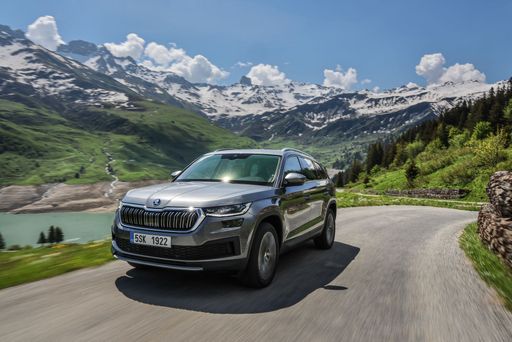 @ skoda-media.de
@ skoda-media.de
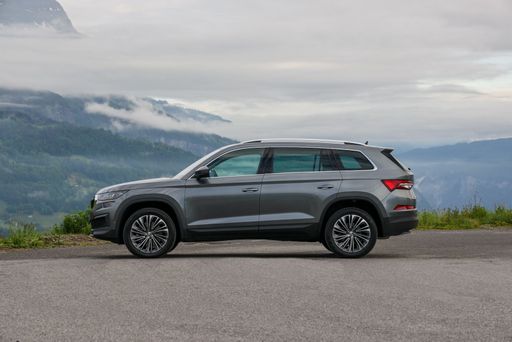 @ skoda-media.de
@ skoda-media.de
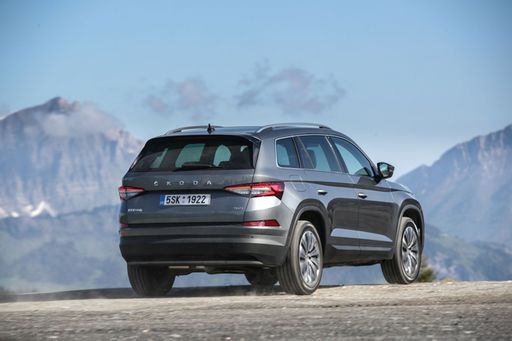 @ skoda-media.de
@ skoda-media.de
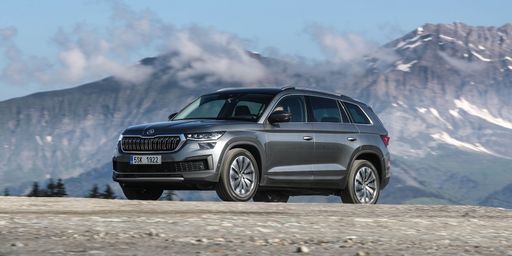 @ skoda-media.de
@ skoda-media.de
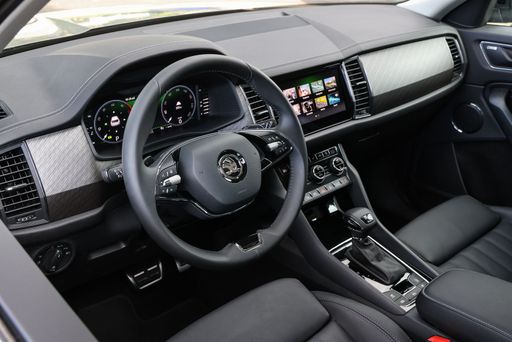 @ skoda-media.de
@ skoda-media.de
Hyundai i30
The Hyundai i30 stands out in the hatchback segment with its sleek design and modern features. It offers a comfortable ride with a well-crafted interior that caters to both driver and passengers. With its emphasis on safety and technology, the i30 provides a balanced driving experience suitable for urban and suburban environments.
details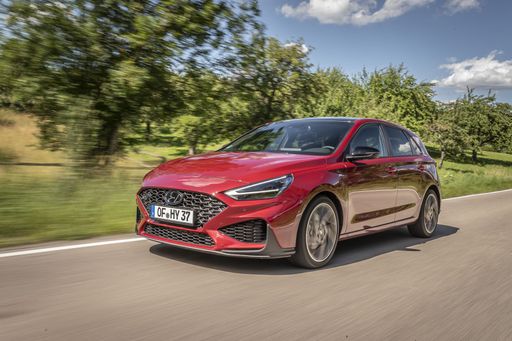 @ hyundai.news
@ hyundai.news
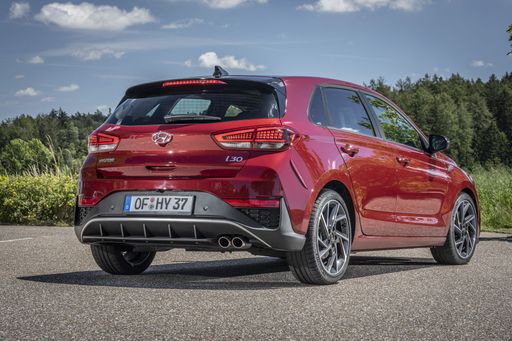 @ hyundai.news
@ hyundai.news
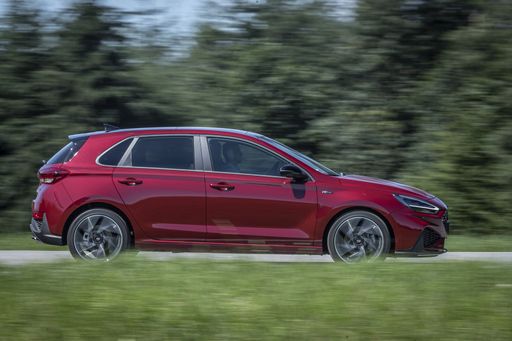 @ hyundai.news
@ hyundai.news
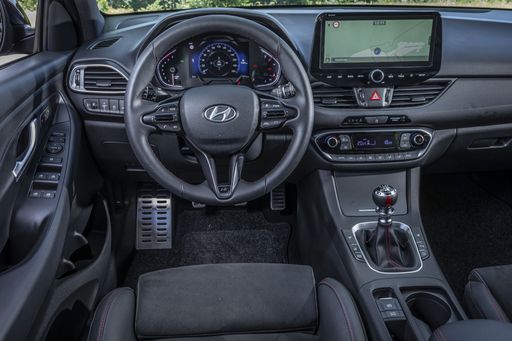 @ hyundai.news
@ hyundai.news
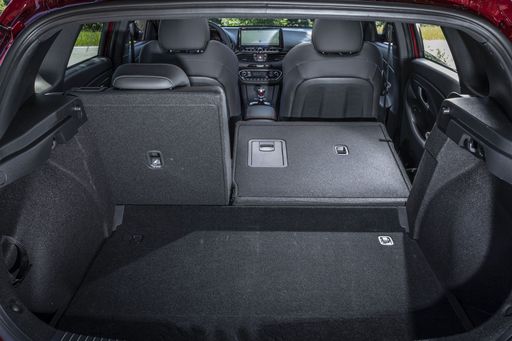 @ hyundai.news
@ hyundai.news

|

|
|
|
|
Costs and Consumption |
|
|---|---|
|
Price
36800 - 49600 £
|
Price
24000 - 29300 £
|
|
Consumption L/100km
0.4 - 8.2 L
|
Consumption L/100km
5.7 - 6 L
|
|
Consumption kWh/100km
-
|
Consumption kWh/100km
-
|
|
Electric Range
113 - 123 km
|
Electric Range
-
|
|
Battery Capacity
19.70 kWh
|
Battery Capacity
-
|
|
co2
9 - 186 g/km
|
co2
130 - 136 g/km
|
|
Fuel tank capacity
45 - 58 L
|
Fuel tank capacity
50 L
|
Dimensions and Body |
|
|---|---|
|
Body Type
SUV
|
Body Type
Hatchback
|
|
Seats
5
|
Seats
5
|
|
Doors
5
|
Doors
5
|
|
Curb weight
1661 - 1913 kg
|
Curb weight
1291 - 1407 kg
|
|
Trunk capacity
745 - 910 L
|
Trunk capacity
395 L
|
|
Length
4758 - 4761 mm
|
Length
4340 mm
|
|
Width
1864 mm
|
Width
1795 mm
|
|
Height
1663 - 1683 mm
|
Height
1455 mm
|
|
Payload
497 - 538 kg
|
Payload
463 - 509 kg
|
Engine and Performance |
|
|---|---|
|
Engine Type
Plugin Hybrid, Petrol MHEV, Diesel, Petrol
|
Engine Type
Petrol, Petrol MHEV
|
|
Transmission
Automatic
|
Transmission
Manuel, Automatic
|
|
Transmission Detail
Automat. Schaltgetriebe (Doppelkupplung)
|
Transmission Detail
Schaltgetriebe, Automat. Schaltgetriebe (Doppelkupplung)
|
|
Drive Type
Front-Wheel Drive, All-Wheel Drive
|
Drive Type
Front-Wheel Drive
|
|
Power HP
150 - 265 HP
|
Power HP
100 - 140 HP
|
|
Acceleration 0-100km/h
6.3 - 9.7 s
|
Acceleration 0-100km/h
9.6 - 13.1 s
|
|
Max Speed
205 - 231 km/h
|
Max Speed
178 - 197 km/h
|
|
Torque
250 - 400 Nm
|
Torque
172 - 253 Nm
|
|
Number of Cylinders
4
|
Number of Cylinders
3 - 4
|
|
Power kW
110 - 195 kW
|
Power kW
74 - 103 kW
|
|
Engine capacity
1498 - 1984 cm3
|
Engine capacity
998 - 1482 cm3
|
General |
|
|---|---|
|
Model Year
2024 - 2025
|
Model Year
2024
|
|
CO2 Efficiency Class
B, E, F, G
|
CO2 Efficiency Class
D, E
|
|
Brand
Skoda
|
Brand
Hyundai
|
Skoda Kodiaq
The Skoda Kodiaq: An SUV at the Cutting Edge of Technology
The Skoda Kodiaq, a strikingly designed SUV, continues to impress with its blend of power, efficiency, and innovation. This popular model from Skoda combines advanced engineering with modern comforts, making it a favourite for families and adventurers alike. In this article, we'll delve into the technical details and innovations that make the Skoda Kodiaq a standout in the auto industry.
Powerful Performance Options
The Skoda Kodiaq offers a range of engine options to suit different driving preferences. From the efficient PlugIn-Hybrid models with up to 204 PS to the robust Diesel engines with up to 193 PS, drivers can choose the balance of power and efficiency that suits them. The performance is managed by an automatic transmission system, ensuring a smooth and responsive ride.
Innovation in Hybrid Technology
Skoda has taken significant strides in integrating hybrid technology into the Kodiaq. The PlugIn-Hybrid models boast an impressive electric range of up to 123 km, a testament to their efficient powertrain technology. Mild-Hybrid options are also available, offering a clever blend of petrol power with electrical assistance to reduce fuel consumption and emissions.
Comfortable and Spacious Interior
The Kodiaq's interior is designed with both luxury and practicality in mind. It offers ample space, with a boot capacity ranging from 745 to 910 litres, making it ideal for long journeys or family holidays. The vehicle's interior dimensions, complemented by a variety of high-tech features, ensure comfort and convenience for all passengers.
Advanced Safety Features
Safety is a top priority in the Skoda Kodiaq, with features such as advanced driver assistance systems, multiple airbags, and comprehensive stability controls. These technologies work together to provide drivers and passengers with peace of mind, whether on city streets or long motorway drives.
Impressive Fuel Efficiency
With fuel consumption rates as low as 0.4 L/100 km for hybrid versions, the Kodiaq sets high standards in terms of efficiency. Its Diesel counterparts also deliver competitive fuel economy. These efficient performances not only benefit your pocket but also contribute to reducing your carbon footprint.
Conclusion: A Blend of Efficiency and Power
In conclusion, the Skoda Kodiaq stands out with its combination of power, efficiency, and innovative technologies. With a variety of configurations to choose from, it is a vehicle that caters to diverse needs while ensuring an engaging driving experience. Whether it's the robust Diesel engines or the eco-friendly hybrid models, the Kodiaq continues to lead the way in the SUV segment.
Hyundai i30
Introducing the Hyundai i30: A Blend of Performance and Innovation
The Hyundai i30 continues to impress the automotive world with its fine balance of performance, efficiency, and cutting-edge technology. As a quintessential hatchback, the i30 caters to a diverse range of drivers, offering a remarkable driving experience through its impressive powertrains and compact yet stylish design.
Dynamic Performance Options
At the heart of the Hyundai i30 lies a variety of engine choices designed to suit different driving preferences. The power output ranges from 100 PS to 280 PS, allowing drivers to choose an i30 that perfectly matches their performance needs. Whether you're inclined towards the spirited drive of the N Performance variants or prefer the efficiency of the mild hybrid versions, there’s a powertrain tailored for you.
Innovative Hybrid Technology
For those seeking enhanced fuel efficiency without compromising on power, the i30’s 48V mild-hybrid system offers a compelling option. Available with both manual and automatic transmissions, this innovative technology provides an ideal balance, reducing emissions and improving fuel consumption, with an impressive average of just 5.7 L/100km.
Sophisticated Design and Features
The Hyundai i30’s sleek design is complemented by thoughtful interior features that elevate the driving experience. With a boot space ranging from 395 to 450 litres, this hatchback ensures ample room for all your luggage needs. Furthermore, the car's aesthetic appeal is matched by its practical ergonomic layout, catering to both style enthusiasts and those seeking functionality.
Advanced Safety and Technology
The i30 is equipped with an array of advanced safety features, enhancing driver confidence and ensuring passenger safety. Its cutting-edge safety suite includes lane-keeping assist, forward collision warning, and adaptive cruise control. Additionally, the i30 offers a modern infotainment system, designed to keep you connected and entertained on every journey.
Conclusion: A Versatile Choice for Modern Drivers
The Hyundai i30 is more than just a hatchback; it’s a remarkable amalgamation of power, efficiency, and modern technology. Whether you're enticed by the high-performance models or the eco-friendly mild-hybrid variants, the i30 stands out as a versatile choice that meets the demands of today’s discerning drivers.
The prices and data displayed are estimates based on German list prices and may vary by country. This information is not legally binding.
